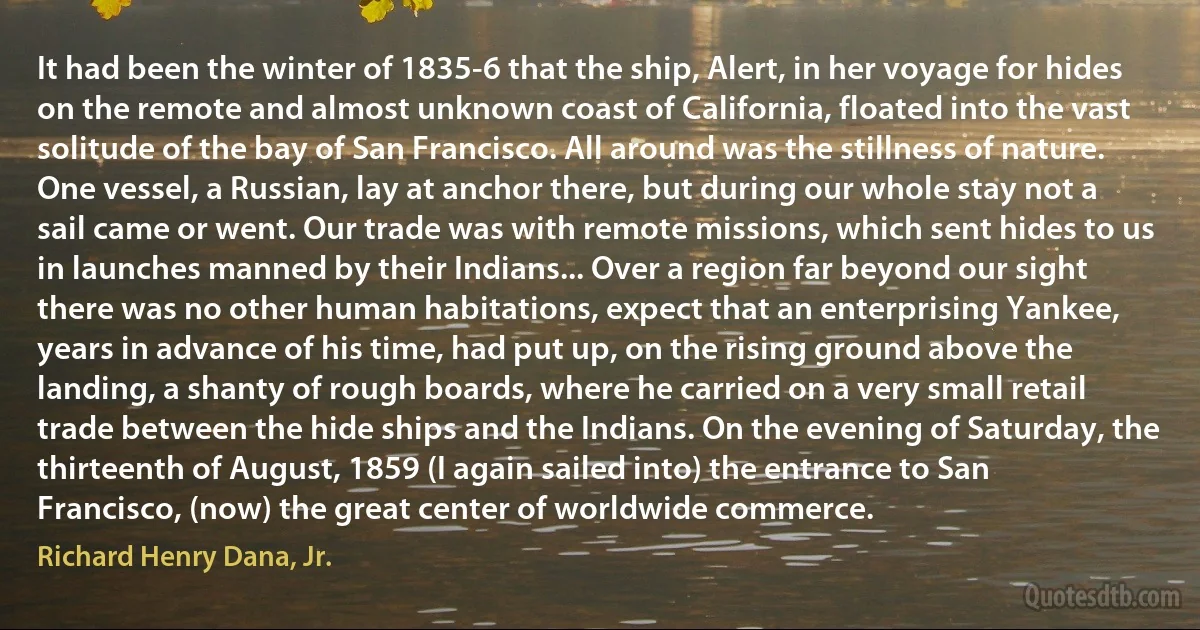
It had been the winter of 1835-6 that the ship, Alert, in her voyage for hides on the remote and almost unknown coast of California, floated into the vast solitude of the bay of San Francisco. All around was the stillness of nature. One vessel, a Russian, lay at anchor there, but during our whole stay not a sail came or went. Our trade was with remote missions, which sent hides to us in launches manned by their Indians... Over a region far beyond our sight there was no other human habitations, expect that an enterprising Yankee, years in advance of his time, had put up, on the rising ground above the landing, a shanty of rough boards, where he carried on a very small retail trade between the hide ships and the Indians. On the evening of Saturday, the thirteenth of August, 1859 (I again sailed into) the entrance to San Francisco, (now) the great center of worldwide commerce.
Richard Henry Dana, Jr.Related topics
above advance almost august beyond came carry enterprising evening expect far went great ground hide human lay man nature now region rising sail sent ship sight small stay stillness time trade unknown vast vessel winter yearsRelated quotes
On the evening of the 29th, the army fell back to the north end of the Island. The next morning, the enemy advanced upon us in two columns upon the east and west road. Our light troops, commanded by Colonel Livingston and Colonel Laurens, attacked the heads of the columns about seven o'clock in the morning, but were beat back they were reinforced with a regiment upon each road. The enemy still proved too strong. General Sullivan formed the army in order of battle, and resolved to wait their approach upon the ground we were encamped on, and sent orders to the light troops to fall back. The enemy came up and formed upon Quaker Hill, a very strong piece of ground, within about one mile and a quarter of our line. We were well posted, with strong works in our rear, and a strong redoubt in front, partly upon the right of the line.

Nathanael Greene
[Meat industry] truly is a disgusting industry, all the more so because it's hidden. Have you ever seen animals being shipped to abattoirs? Do you even know where these abattoirs are? Have you ever seen an animal getting killed for the food you eat? It's a dark, dark, dark trade that nobody really knows about, and a hugely profitable one at that. ... If I don't believe in killing animals, why on earth would I do it for the sake of fashion ... I don't think there's any difference, because at the end of the day you're killing an animal and stripping its skin off its body. It's somebody's baby – or it has a baby – it breathes, it lives, it has emotions, it has feelings ... I find it fascinating that leather and fur are so often associated with the top luxury level of fashion. And yet leather, in this day and age, is probably cheaper than a piece of cotton. So there's such a tiny price put on an animal's life.

Stella McCartney
As for New England as a seat of weirdness-a little historic reflection will show why it is more naturally redolent of the bizarre & the sinister than any other part of America. It was here that the most gloomy-minded of all the colonists settled; & here that the dark moods & cryptic hills pressed closest. An abnormal Puritan psychology led to all kinds of repression, furtiveness, & grotesque hidden crime, while the long winters & backwoods isolation fostered monstrous secrets which never came to light. To me there is nothing more fraught with mystery & terror than a remote Massachusetts farmhouse against a lonely hill. Where else could an outbreak like the Salem witchcraft have occurred? Rhode Island does not share these tenedencies-its history & settlement being different from those of other parts of New England-but just across the line in the old Bay State the macabre broods at its strongest.

H. P. Lovecraft
[R]adical Islam is heir, above all, to Nazism. The destruction of the World Trade Center was meant not only to wreak terror. Like the smashing of the Bamiyan Buddhas, it was meant to obliterate greatness and beauty, elegance and grace. These artifacts represented civilization embodied in stone or steel. They had to be destroyed. This worship of death and destruction is a nihilism of a ferocity unlike any since the Nazis burned books, then art, then whole peoples. Goebbels would have marvelled at the recruitment tape for al Qaeda, a two-hour orgy of blood and death: image after image of brutalized Muslims shown in various poses of victimization, followed by glorious images of desecration of the infidel-mutilated American soldiers in Somalia, the destruction of the USS Cole, mangled bodies at the American embassies in Kenya and Tanzania.

Charles Krauthammer
Ancient scriptures tell us that man is more than the physical body. In fact, we have two bodies: the physical and the astral, or subtle. But we are the soul! According to the ancient Vedic scriptures of India, the size of the soul is 1/10,000 the tip of a strand of hair. It is located in the heart region and is the actual life force. The physical, as well as the astral or subtle body, acts as a covering or costume that the soul wears in its journey throughout the material sphere. As we pass from costume to costume or from body to body through the process known as reincarnation, the impressions of previous lives imprint themselves on the subtle body and are carried with us during each lifetime. In the dream state, activity in the subtle body becomes more dominant than activity in the physical body. Our dream experiences are often impressions accumulated from many lifetimes.

Bhakti Tirtha Swami
